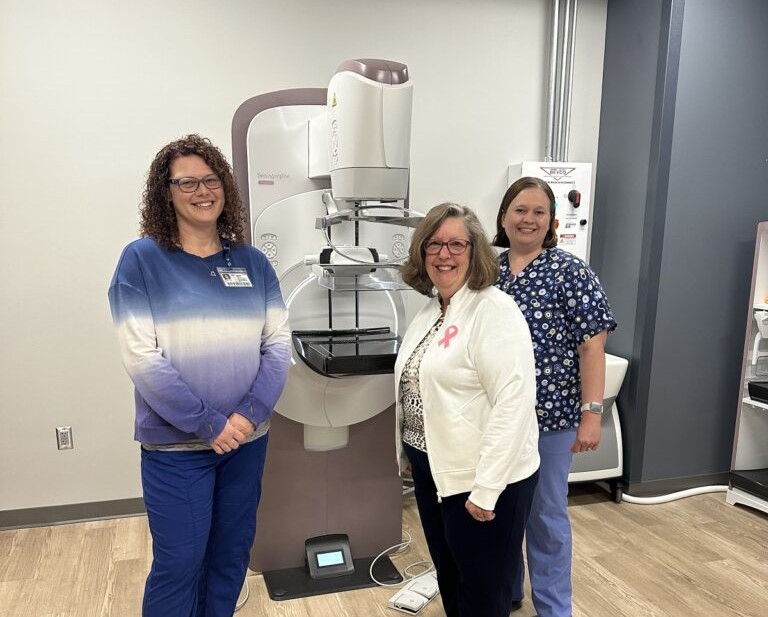It was a cold day in January 2015 when Seymour resident Betsy Elliott took a phone call from her doctor. She was sitting in her car in a Walgreen’s parking lot. It was the news no one wants to receive: she had breast cancer.
Moments after receiving this sobering diagnosis, Elliott recalls a sense of peace settling over her. “I knew the Good Lord had me in His hands.”
Elliott has always been healthy and followed doctor’s orders, including getting annual screening mammograms. A mammogram is a non-invasive procedure that takes an image of your breast using X-ray technology. These screenings are used to find and diagnose breast disease in women and are recommended annually for women over the age of 40.
After a lump was detected in a screening mammogram in 2014, they ran additional testing which revealed she had breast cancer, which Elliot was told they caught early. DCIS, or “ductal carcinoma in situ,” is an early form of breast cancer. Because more people are getting screened, it has become an increasingly common diagnosis.
She was diagnosed in early 2015. After receiving two lumpectomies, which removed the tumor and surrounding tissue, Elliot underwent a full mastectomy of her left breast, a surgery in which her breast was removed.
I did so much praying. My friends and family were a huge support to me. I am so blessed because I know so many have had tougher journeys. The Good Lord was with me the entire time. We just say ‘breast c’ to not give any power to ‘the c-word’ — we don’t say it or write it in my family. The power belongs to the Lord.
Elliott is retired after a 33 year-career as a grade school teacher. She taught in Sevier County for the last 27 years, where she remains a beloved teacher and volunteer to students and staff. She enjoys spending time with her three children and five grandchildren. She and her husband will celebrate 50 years of marriage this November, and they are still best friends.
Since her surgery, Elliott has recovered well and continued getting annual screenings. As a resident of Seymour, Elliott had the honor of being the first patient to undergo a screening mammogram at Covenant Health Diagnostics South, located at 7625 Chapman Highway. This diagnostic center is part of Covenant Health South, a new campus offering a variety of healthcare services.
The brand-new building is gorgeous. It has lovely artwork and is very inviting. The staff were wonderful. I was the first one to get a screening there. It was fabulous not having to drive across the river and go many miles elsewhere. It was a good, convenient location.
Lauren Reagan is the imaging manager of Covenant Health Diagnostics South. She has worked within the Covenant Health system for 21 years and was thrilled to see the new Covenant Health South location open because she is a resident of the South Knoxville community.
I am excited to serve patients in my community, and I hope we can help people closer to their home and get them the tests they need without having to travel.
Her team assists patients through diagnostic tests including mammograms, bone density screenings, ultrasounds, CTs, MRIs and echocardiograms. This diagnostics center offers 3D mammography, which is the latest technology for detecting breast cancer early, especially in women with dense breast tissue.
It was an honor to treat Ms. Elliott and she is doing a good job of continuing her screenings. It’s so important for all women to get screened, because these tests help catch any abnormalities early, which gives those with a cancer diagnosis a better outcome.
The retired schoolteacher and cancer survivor says:
I give God the glory, honor and credit for getting me through the hard times and blessing me with a feeling of peace. I can’t say enough for the healthcare workers, not just the ones who treated me, but in every capacity. They work so hard for the betterment of others; I am so grateful to them.
Screening mammography
The American Cancer Society recommends screening for women who are at average risk starting at age 40. Mammograms should be done every year for all women ages 45 to 54.
There are 2 types of mammograms:
• Screening mammograms are used to find any breast changes in women who have no signs of breast cancer. Often, two X-rays are taken of each breast. A mammogram can find a tumor before it can be felt.
• Diagnostic mammograms are used to diagnose abnormal breast changes. These may include a lump, pain, nipple thickening or discharge, or a change in breast size or shape. More pictures are taken than during a screening mammogram. A diagnostic mammogram is also used to check any problems found on a screening mammogram.
Talk with your healthcare provider to find out which screening guidelines are right for you.
Need a doctor?
Covenant Health’s more than 1,300 affiliated primary care and specialty physicians are ready to provide you with the right care at the right time. Visit our online physician directory to find a doctor in your area.
Covenant Health provided information for this article

